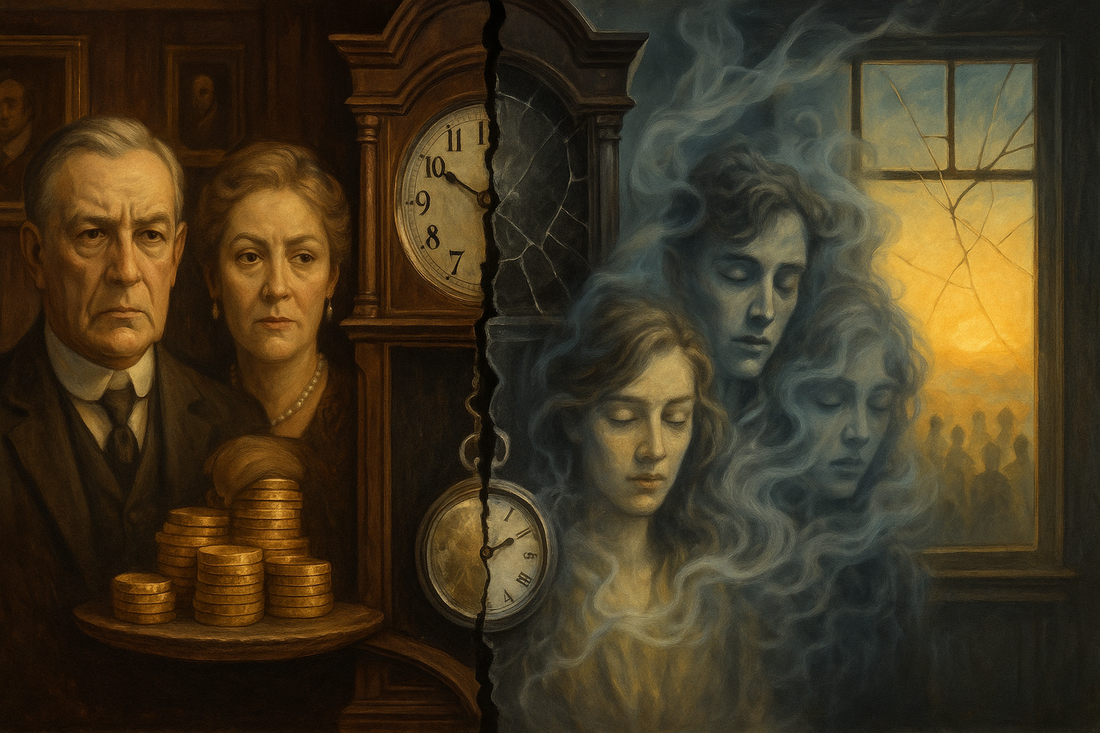
The Generational Divide in An Inspector Calls
Jason PerinbamShare
Confused about the generational conflict in An Inspector Calls? Don’t worry—this guide explains how Priestley uses the younger and older characters to show clashing values, challenge outdated ideas, and drive his socialist message. Want detailed theme breakdowns, 50+ annotated quotes, and full Grade 9 exemplar essays? Download our An Inspector Calls Cheat Sheet—your shortcut to GCSE success.
What Is the Generational Divide?
In An Inspector Calls, J.B. Priestley draws a sharp line between the younger and older generations. The divide represents a broader clash between progressive change and conservative tradition, and Priestley clearly favours the younger generation.
Older Generation
- Mr and Mrs Birling
- Stubborn, elitist, resistant to change
- Refuse to accept responsibility
- Obsessed with reputation and status
Younger Generation
- Sheila and Eric
- Open to change and learning
- Acknowledge their mistakes
- Embody hope for a better, fairer society
Why Does Priestley Highlight This Divide?
Priestley wrote the play in 1945—just after WWII—at a time when younger generations were demanding social reform, equality, and accountability. He uses this generational conflict to highlight the need for:
- Responsibility over denial
- Progress over tradition
- Collective change over individualism
Key Moments That Show the Divide
Mr Birling’s Arrogance
- “The famous younger generation who know it all. And they can’t even take a joke!”
▶ This mocking tone shows his dismissive attitude towards youth and change. Priestley positions him as a symbol of outdated thinking.
Sheila's Growth
- “I know I’m to blame—and I’m desperately sorry.”
▶ Sheila accepts responsibility quickly, showing emotional maturity and the capacity for change—everything her parents lack.
Mrs Birling’s Coldness
- “I accept no blame for it at all.”
▶ Her lack of remorse and refusal to change demonstrate how the older generation clings to outdated values, even when faced with moral failure.
Eric’s Emotional Realisation
- “We helped to kill her.”
▶ Eric’s blunt confession and growing guilt show he understands the consequences of his actions—he becomes a symbol of moral awakening.
Key Themes Linked to the Divide
- Responsibility – Young characters accept it; older characters reject it
-
Class and Power – Older characters use status to deflect blame
-
Social Change – The younger generation represents Priestley’s hope for a more equal future
- Morality vs. Reputation – Youth care about ethics; adults care about appearances
Grade 9 Language for Essays
Level up your analysis by using these high-level terms:
- Progressive – Supporting change and reform
- Intransigent – Refusing to change or compromise
- Subversive – Challenging the status quo
- Obdurate – Stubbornly resistant to moral responsibility
- Reformist – Believing in societal improvement through change
- Didactic – Intended to teach or convey a moral message
Link It to Context (Top Exam Tip!)
- 1912 Setting: Older generation in power, resistant to social change
- 1945 Audience: Emerging welfare state, growing support for socialism
- Priestley uses this contrast to critique inaction and promote change led by youth
Want Full Analysis, Exemplar Paragraphs & More Quotes?
This is just a snippet of our An Inspector Calls Themes Cheat Sheet, which includes:
✅ Deep character profiles (Birling, Sheila, Inspector, and more)
✅ Grade 9 essay examples with examiner annotations
✅ Theme breakdowns + key context to boost your analysis
✅ 50+ premium quotes with advanced analysis
🚀 Upgrade your revision—download the full guide now!
P.S. Struggling with analysis or quotes? Our text-specific cheat sheets break down An Inspector Calls, A Christmas Carol, and more into Grade 9-ready notes.
Why JP Tutors Hub?
Founded by a straight-A student, our resources are:
✨ Exam-board aligned
✨ Used by thousands of GCSE students
✨ Designed to save you time and boost marks
Follow us for more free tips—or visit our shop to upgrade your revision! 🚀